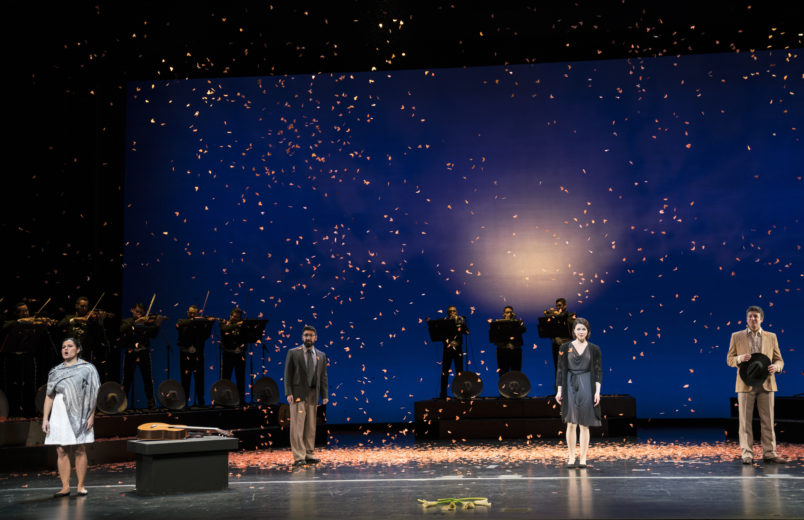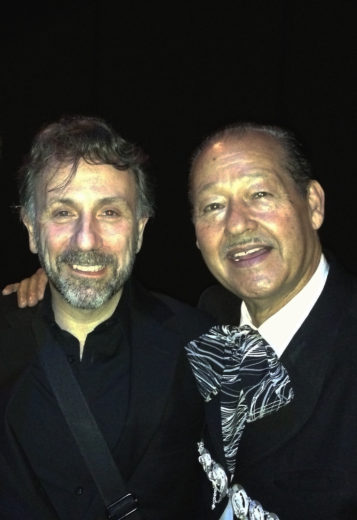
‘LL: Why does your story focus on migrant workers and their immigrant experience?
LF: The story developed by my fascination with the Bracero program, and how those men went back and forth during the picking season, and as years went on, they would come to Texas and California to pick the fruit, and then they would learn that there was work in the winter in Chicago, and they would start coming home less and less, and they would become more Americanized. In the opera, there is a song called “Un Pueblo Sin Hombres” and Renata sings about all the half-finished houses. And that always struck me in Mexico, all the half-finished houses you would see. They start with the best intentions of sending money back and building their lives in Mexico, but as they become more American, they don’t want to go back.
‘LL: Butterflies are a recurring theme throughout the opera. What is the story behind that choice?
LF: I wanted it to be a generational opera – and I was taken by the notion of the butterflies in Michoacán, and the notion of the metaphor of how hard it is for people to get across the border, but how easy it is for the butterflies.

Leonard Foglia and Jose “Pepe” Martinez
‘LL: Based on what I know of classical theater, when the main characters die, it’s considered a tragedy. Is it because of a tragic flaw, or the circumstance that leads them down their path?
LF: The thing about Renata and Laurentino, the two main characters, is that they are good people who make bad decisions. It is about all our lives, look at all the bad decisions we make with the best intentions…He keeps going, she doesn’t want him to go, and seven years later he keeps going, staying away longer and longer, and then for all the best intentions she decides “alright it looks like our lives will be in the U.S., then we’ll just go” and we see what happens.
‘LL: There is also a secondary plot of two brothers, separated by years and borders, and their different experiences with their father. What did you want people to take away from the relationships between these three men?
LF: In this case, I specifically stayed away from the notion of someone ‘voluntarily’ having a second family – either with an affair or something. In this case it was bad circumstances that divided (Laurentino) from his son. So you have someone who has a view of his father that has given to him by his relatives, and also what he witnessed at seven years old, his mother dying in the desert trying to get to his father. For his entire life, he blames his father for it, without ever putting himself in the place of his father and understanding the pain that his father went through – that’s the thing, we only look at our own pain. One of the scenes that still gets to me is that one scene that is 25 years ago where the father goes back to track his son and the son denies him, and that’s all Laurentino ever wanted.
‘LL: What has been the reaction by Latinos to your opera. Why do you think it might appeal to them?
LF: All of those places drew out the Mexican American and Latino community in droves. What I found and I didn’t realize going in – here was a story being told, your story is being told in your language, and your musical vernacular, and that has been more powerful than I would have expected. So much of opera is filtered through the European sensibility, but here it is, it’s your music, your history, your story – it’s yours. We did this at a Lyric Opera in Chicago, a 3,500-seat opera house, the second largest in North America. It was the first time in the history of the opera company that Spanish had either been sung or spoken on that stage, ever. That’s what has been the most rewarding for me, to put that up there. It’s been beautiful to watch.
‘LL: What would you say to people, about exploring opera?
LF: I would probably take off the word “opera.” I think it interesting that in the New York Times review – the critic said “Or call it a chamber opera, or a music-theater piece. It hardly matters.” He took it for what it was – music. That meant a lot to me. Hamilton uses rap to tell a story, we use Mariachi to tell a story, all we are trying to do is tell story that will have some meaning to for people, and tell it in a musically exciting way.
‘LL: That’s pretty revolutionary, don’t you think?
LF: When we started doing this – we premiered it seven years ago, so many opera companies were very snobby about it. The first couple of opera companies presented it as a “special event” It’s very interesting to watch the evolution. First, we’d come in for a weekend, as if it were a special concert or something, but it would not be part of their season. Then a couple years ago Arizona Opera Company was the very first one actually to put it in their season. And then Fort Worth put it in their season, and now NYC Opera put it in their season, so that’s a real evolution, and what it is great for Spanish language opera, great for the Latino community.
Cruzar la Cara de la Luna is currently on Tour – Now Playing at Valley Performing Arts Center, in Northridge, CA on February 17th and 18th
